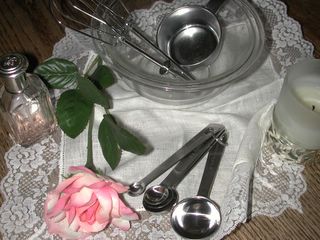
Most published romance writers are pretty quick to deny it when anyone dares to suggest that category (or "series") romance novels are written to a formula. But I insist that there is indeed a recipe for romance. The category books absolutely do follow a formula.
Do you disagree? Then go ahead, please, and tell me which step in this "romance recipe" is not always followed in a category romance novel:
1. The hero and heroine will meet (or meet after a longThese steps came right off the top of my head, so I've probably left out something important, but I think this is enough to get my point across. Why do we pretend there is no formula for romance novels? Because we feel it cheapens the genre and makes us look like unimaginative imitators rather than intrepid innovators?
separation) within the first few pages.
2. Early on it will be made clear to the reader, although
not necessarily to the hero and heroine, that this couple
absolutely belongs together.
3. Physical or emotional obstacles (usually both) will
make it seem impossible that this man and woman, as
perfect for each other as they are, could ever be together.
4. After many trials, one or both characters will make a
sacrifice for the other and/or change in some major way
that proves their love and opens the possibility of a
future together.
5. After the last big crisis is resolved the hero and
heroine will admit their love to themselves and to each
other and will then enter into a committed relationship.
That's ridiculous. Are we really that insecure? Anyone who thinks it's easy to follow this recipe and write a salable romance novel should try doing it sometime.
Writing a romance novel is a lot like making chicken soup. Certain ingredients are always going to be present in chicken soup (chicken and water, for instance), but other things can be tossed in, as well, so your chicken soup will be very different from mine. Mine's thin, with savory broth. Is yours thick and creamy? I never put rice or noodles in mine, do you?
All chicken soup is similar in some very basic ways (that chicken-and-water thing again), but not all chicken soup tastes the same. And so it is with romance novels. Even when many of the same elements are present, each author will handle them in very different ways to craft stories as unique as snowflakes.
So, yes, there's a basic recipe for writing romance novels. But that doesn't mean it's easy to make a good romance novel, and it doesn't mean that all romance novels will "taste" the same. Recognizing that should deepen rather than lessen our admiration for the genre.
1 comment:
I totally agree. I am a new writer. I just completed my first novel. I haven't signed with an agent yet, but I have sent out queries. I love writing romance suspense, and I have to agree with your post. Regardless of the subgenre, its the same formula, but it can be approached in different ways, like 25+25, 10+40, 10*5, 10+10+10+10+10, 25*2, etc. you get the picture.
Post a Comment